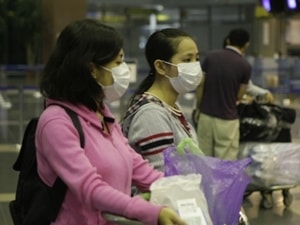Vietnam has not had any cases of Mers-Cov respiratory disease.
On the afternoon of July 15, Dr. Tran Dac Phu - Deputy Director of the Department of Preventive Medicine (Ministry of Health) affirmed that up to now, Vietnam has not recorded any cases of acute respiratory infection caused by MERS-CoV virus.

Tourists passing through Noi Bai International Airport wear masks to prevent the epidemic. (Photo: Nhat Anh/VNA)
In the meeting of the Steering Committee for Disease Prevention held on the same afternoon, Mr. Phu said that in recent months, the acute respiratory disease caused by the MERS-CoV virus has been on the rise in the world and there have been some changes in the epidemiological situation affecting many countries, including Vietnam.
Referring to the danger level of this epidemic, the Deputy Director of the Department of Preventive Medicine stated that acute respiratory infection caused by MERS-CoV virus can enter Vietnam through the entry of people coming from epidemic areas, through the expansion of trade and tourism exchanges between Vietnam and countries around the world.
According to information from the Ministry of Health, from April 2012 to July 15, 2013, the world has recorded 82 cases testing positive for MERS-CoV, including 45 deaths. WHO assesses this as a dangerous disease, with a high mortality rate among infectious diseases (accounting for 56% of the total number of cases). In particular, there is currently no vaccine to prevent this disease, and no specific treatment.
Regarding this epidemic, the World Health Organization (WHO) has agreed on the name of the new strain of Corona virus that causes Middle East respiratory syndrome MERS-CoV.
Currently, the epidemic has been recorded in 9 countries, mainly in Saudi Arabia with 65 cases (accounting for nearly 80%) and 37 deaths (accounting for more than 82%).
The Deputy Director of the Department of Preventive Medicine said that acute respiratory infections caused by the MERS-CoV virus can occur in most age groups, but mainly in the elderly, men (65%), people with chronic diseases, and middle-aged people.
Through epidemiological investigations, WHO experts have shown that the virus is transmitted from person to person through close contact, but has not yet recorded widespread spread in the community. There are currently no major exposure factors or risk factors for sporadic cases in the community.
According to WHO, most reported cases have symptoms of acute respiratory infection and lead to respiratory failure and multiple organ failure; the average incubation period is more than 5 days.
However, the representative of the Ministry of Health also expressed concern when recently in Saudi Arabia recorded 8 cases of virus infection without symptoms in some medical staff and children. This raised concerns about the difficulties in early detection and control of disease transmission in the community and between different countries.
“Transmission may be through contact or through small droplets, but this also requires further research to understand the risks of the disease,” Dr. Phu analyzed.
Therefore, to prevent the above epidemic, immediately after receiving information about cases of the disease in some countries, the Vietnamese Ministry of Health focused on directing relevant departments to strengthen monitoring, take samples of suspected cases to detect cases early; increase medical surveillance at border gates, especially cases returning from epidemic areas, and prepare capacity for diagnosing the virus causing the disease...
In addition, the prevention centers have prepared mobile teams for epidemic prevention, supplies and equipment for epidemic prevention, and increased monitoring of cases of acute respiratory infections in the community.
The Ministry of Health is also preparing to establish an Emergency Response Office for Disease Prevention and Control under the Steering Committee for Prevention of Dangerous and Emerging Diseases.
To prevent the disease, the Department of Preventive Medicine recommends that people practice good personal hygiene to prevent the disease, such as washing hands regularly with soap and antiseptic solution, and wearing masks when going out to avoid infection./.
According to information from the Central Institute of Hygiene and Epidemiology, since the beginning of the year, the institute has tested 708 samples suspected of being infected with acute upper respiratory tract infection and A/H7N9 flu.
However, the test results showed negative results - no cases of the above two diseases were found.
According to (Vietnam+) - LT






